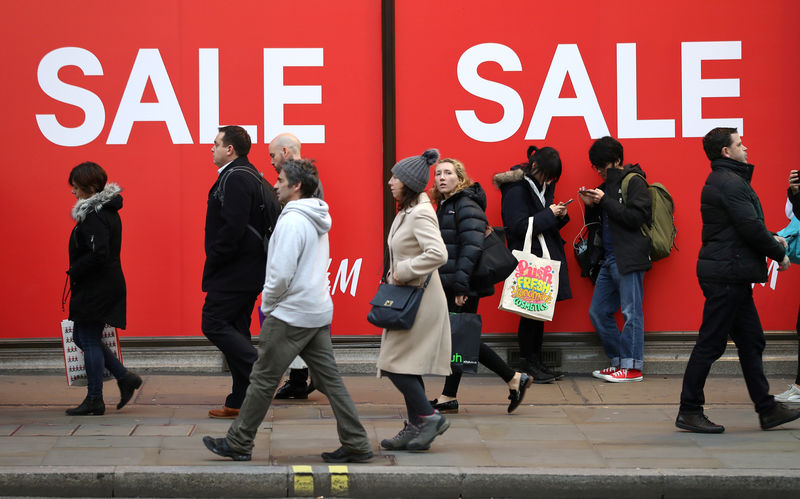By Andy Bruce and David Milliken
LONDON (Reuters) - British shoppers' New Year resolutions to get fit proved less healthy for retailers last month, as sales rose much less than expected and a longer-term backdrop of rising prices and lacklustre wages also weighed on growth.
Even by the standards of a normal January, demand for gym wear and sporting goods was unusually high - but this was not enough to offset a chunky fall in the volume of food purchases, the Office for National Statistics said on Friday.
Overall, retail sales volumes rose 0.1 percent on the month, well below forecasts in a Reuters poll for a monthly rise of 0.5 percent, after dropping 1.4 percent in December.
In year-on-year terms, sales grew by 1.6 percent - the fastest since August, but still right at the bottom end of economists' range of forecasts.
"Analysts will no doubt be digesting these figures to determine if this was a reflection of households setting about 2018 with the aim of shedding some pounds, or ... merely symptomatic of the extent of the broader household cash squeeze underway," Investec economist Victoria Clarke said.
Britain's economy underperformed its rivals last year as higher inflation - caused by the fall in the pound since June 2016's Brexit vote - hurt consumers' spending power, though forecasts for a severe downturn proved too pessimistic.
The Bank of England expects the consumer squeeze to ease in 2018 as inflation cools from near six-year highs and wage growth ticks higher, although surveys of British households suggest sentiment remains subdued.
Andrew Sentance, a senior economic adviser to accountants PwC and former BoE rate-setter, said it would take until the second half of the year at the earliest until consumers felt the benefit of lower inflation.
Consumer price inflation hit its highest in more than five years in November, at 3.1 percent, and has barely fallen since, though the narrower gauge used for retail sales dropped to a six-month low of 2.8 percent last month.
"The first half of this year will continue to be a difficult environment for retailers and other consumer-facing sectors," Sentance said.
Last week the BoE forecast real-terms household consumption growth would slow to 1.25 percent in 2018 from 1.5 percent in 2017 as demand shifted towards business investment and exports.
Looking at sales over the three months to January, which smoothes out sharp moves caused by November's Black Friday discounts, sales inched up just 0.1 percent after a rise of 0.5 percent in the three months to December, marking the weakest three-month period since April 2017.

The figures took some shine off sterling, which was headed for its best weekly performance against the U.S. dollar in five months.
In cash terms, spending in the three months to January was 4.4 percent higher than a year earlier, with 3.0 percent growth in food spending. Shoppers are also stretching their budgets by switch to cheaper food stores.
Market research company Kantar Worldpanel said last week that Tesco (LON:TSCO) was the top performer of Britain's four largest supermarket groups over the 12 weeks to the end of January, posting sales growth of 2.6 percent. All four lost market share to discount chains Aldi and Lidl.